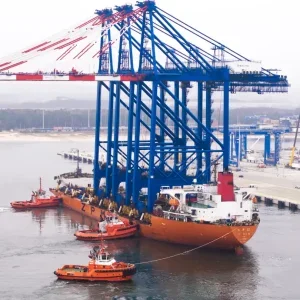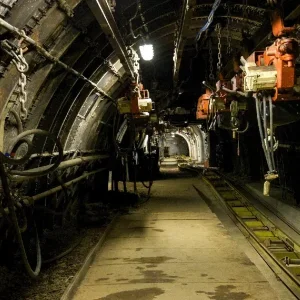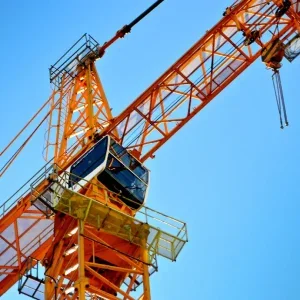The new mobile harbour crane is destined to arrive at the Port in March. It will have two operators: Sogester in Angola and Intels Nigeria Ltd.
APM Terminals operates a fleet of nine machines. These are not only within Nigeria at the Port of Apapa, but at terminals in Benin and in Angola.
Liebherr has a long history supplying mobile harbour cranes in Africa. It supplied its first two mobile harbour crane to Africa in 1976. The two mobile harbour cranes were destined for container handling in Libya.
Civil unrest during independence movements hindered Liebherr’s business in Africa in the following two decades, it said.
A turning point came in 1996 when Liebherr delivered its first mobile harbour cranes suitable for bulk handling to ports in South Africa and Namibia. Large orders went to customers in Namibia and Nigeria in 2001, increasing the overall number of its mobile harbour cranes in Africa.
The Liebherr said that 70 of its mobile harbour cranes were in operation in Africa in 2007 for general cargo, bulk and container applications, with a majority using equipment for container handling applications.
Liebherr said that demand continues to increase in several countries: “The ongoing economic development in several African countries has favoured an increased demand for highly competitive and top quality products, which provide maximum flexibility. Liebherr’s innovative cargo handling solutions perfectly meet these requirements.”
Nigeria is Liebherr’s largest market currently. Liebherr said, “Nigeria accounts for almost one quarter of all Liebherr Mobile Harbour Cranes in Africa, with a total of 24. Algeria follows closely with 21 LHMs in operation. Moreover, Algeria, along with its neighbour countries Libya and Tunisia [have bought] 43 machines. However, recent development shows that the southern and western regions of the continent are catching-up, mainly driven by Nigeria and South Africa.”
A Tunisian stevedoring and handling company, Stam, has become a major African client for Liebherr, ordering four of its mobile harbour cranes in the past two years.
Stam’s purchasing director, Sami Battikh, said, “Currently, we have seven LHMs in operation in three Tunisian ports. Five LHMs are totally dedicated to container handling, the other two operate general cargo, dry bulk and containers. These cranes offer utmost performance, are robust and impress by state-of-the-art technology.”
Ports and Cargo Handling Services, operating at the Tin Can Island Port in Lagos, Nigeria, took delivery of four LHM 400 mobile harbour cranes in 2008.
Ports and Cargo serves the maritime, aviation and oil and gas industries in Nigeria, a subsidiary of the SIFAX group.
Its LHM 400 mobile harbour cranes were equipped with Cycoptronic, and included Liebherr’s Teach-In feature for faster and safer cargo handling.
Captain Luc Deruyver, managing director of the group, said: “LHM’s high safety standards and ultra-modern design simplifies operation of such a heavy-duty machine. Its unique flexibility makes it easy to work with two cranes at very close hatches at the same time.”
In 2010, Inter-Bau Construction, construction company in Nigeria, ordered two LHM 180 mobile harbour cranes for work on the Onitsha River Port project. Inter-Bau Construction’s LHM 180 handles break bulk cargoes and some containers.
“Due to superior technology advantage, reasonable pricing and excellent after sales support, Liebherr was the preferred vendor. Their high degree of professionalism impressed throughout the buying process,” said Sir Nath Okechukwu, owner and chairman of the group.
Liebherr said that its LHM 400 and LHM 250 are important models for its African market and estimates that 19 of each are in operation.
Liebherr also said its newest model, type LHM 420, designed for versatile and efficient cargo handling with a maximum lifting capacity of 124 tons, is targeted at this market.
It estimates that, with the global trend that sees increasing for heavier duty cranes, the new LHM 550 will become a popular unit. It has sold eight in the region. Four LHM 550s equipped with Liebherr’s hybrid drive system, Pactronic, started operation in Africa recently. The system increases turnover and decreasing fuel consumption.






